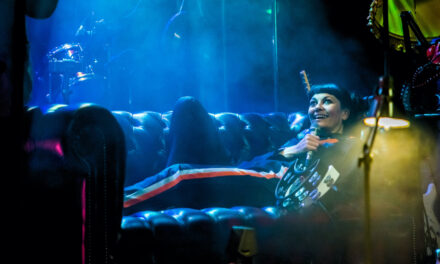Director Rufus Norris has set this National Theatre version of Macbeth in a dystopian post-apocalyptic near future, with a set draped in tattered plastics dominated by a steeply sloping central bridge. There are remnants of the ephemera of our modern lives, but the technologies have disappeared so we are back to oil lamps, shabby garments and swords and daggers to resolve differences.
This is the Brexit Macbeth.
Shakespeare gave us a tale of what goes wrong when the increasingly deranged members of a small ruling elite lose all sense of perspective in the bloody pursuit of their lust for ever more power. How topical. He takes some real history and characteristically mangles it to suit his purpose, and in doing so has left us one of the most powerful and frequently performed dramas that the world has ever known.
Macbeth has been played and adapted for centuries, and the adaptations, according to the programme notes from Dr Paul Prescott, ‘thrive in times of suspicion, paranoia and fear’. So take a look at Macbeth, Lady Macbeth, their supporters and their enemies, then try not to switch your gaze to quickly to some of those who dominate our airwaves today. Too close for comfort.
It helps us to understand Shakespeare’s moral stance that this is as good a production of the ‘Scottish Play’ as I have ever seen. It has a terrifyingly impressive set design, which I was privileged to walk around before the play started. Dominated by the central sloping bridge this clever design allows several sub-plots to be highlighted by lighting and soundscape in a very effective manner.
Kirsty Besterman gives us a Lady Macbeth we can relate to, emphasising her loyalty, ambition and sense of purpose rather than focusing just on her self destructive insanity as the body count rises. Michael Nardone is a majestic Macbeth who still manages to look strangely familiar, like that ambitious but over emotional office manager that once blighted your working life. The cost of relentless greedy ambition is at the core of this play, and these two give a very fine account of the increasingly desperate interdependence of the couple as their plots unfold.
Some of the stage set pieces of many a Macbeth are strangely muted here. The witches are disturbingly odd rather than gothic comic, with rather annoying levels of echo jumbling their words. The Porter’s soliloquy, often a rare moment of word perfect joy bobbing in a sea of bleakness, seems more out of place than I recall from previous stagings. There are moments of laughter from the audience, not all in nervous relief as another severed head is bagged, but from the clever nuancing of the dialogues.
The Director has tried to edit out some of the later additions to the Shakespeare text but we are still left with some questions that reflect the apparent gaps in the folio texts that only appeared after the author’s death. Most notably, we will probably never really know why Shakespeare had Macbeth and Banquo fall out but the consequences are legendary and nicely presented here.
While it always takes a minute or two to settle your ears into Shakespearian linguistics we soon realise that a huge amount of this text has passed into the phrase and fable that we still use in our everyday language, a considerable achievement for a 400 year old text. This could make life difficult for an actor trying to avoid cliché, but this competent cast never hesitates in delivering a Macbeth as modern and relevant as you will find.
Tickets for this run will be hard to obtain, but do what you must to get some. Best not murder for them, as even without my disapprobation Shakespeare makes it clear you would have a problem sleeping with the consequences of your actions, however purposeful they may have seemed at the time.
There are no passengers in this excellent cast, all contribute memorable performances. I was particularly fascinated by Joseph Brown as Malcolm, who seems at first to be a rather effete and unworldly young man out of place in this world of violent Scottish ambition but proceeds to draw triumph from his family tragedy. The costume designer Moritz Junge gives us a muted cast look pierced by the startling red suit and coat that denotes kingship, while using the formal application of gaffer tape to fix ‘armour’ in place on Macbeth.
This is a thoughtful and engaging Macbeth that allows us to focus on the strength of the text and concept while enjoying a visually stunning play – the whole is greater than the sum of the parts, a huge achievement with one of the most well known Shakespeare plays. While a few familiar phrases may be missing the Director has assembled the play into a cohesive whole production that will become a reference point for future companies tackling this most famous of Shakespeare’s works.
© Julian Swainson 2018
Read more about Macbeth here: https://norwicheye.co.uk/whats-on/sleep-no-moreshakespeares-most-popular-tragedy-heads-for-norwich/
Listing:
The National Theatre’s Macbeth is at Norwich Theatre Royal from October 30 to November 3 at 7.30pm nightly (2.30pm matinees on November 1 & 3). Tickets from £10-£33. Discounts for Friends & Corporate Club, Over 60s, Under 18s, Schools and Groups. Captioned Performance November 1, 2.30pm. Audio Described Performance November 3, 2.30pm. See www.theatreroyalnorwich.co.uk for more information or to book tickets.




Recent Comments